Factors Determining Construction Project Success: An Analysis
VerifiedAdded on 2022/11/14
|7
|2472
|187
Report
AI Summary
This report delves into the multifaceted criteria for evaluating the success of construction projects. It emphasizes the critical role of planning, cost management, and time efficiency as primary indicators of a project's outcome. The report explores various factors, including safety standards, employee satisfaction, learning and development, profitability, cash flow management, and environmental performance. It highlights the importance of early planning and the involvement of all stakeholders to ensure financial success and timely completion. The report also underscores the significance of cost planning, procurement processes, and the impact of the project team on overall project outcomes. It concludes by advocating for a standardized definition of project success and universal criteria for evaluation to reduce ambiguity and enhance the construction industry's practices. The report provides a comprehensive overview of the critical elements that determine project success, offering valuable insights for construction professionals and students alike.
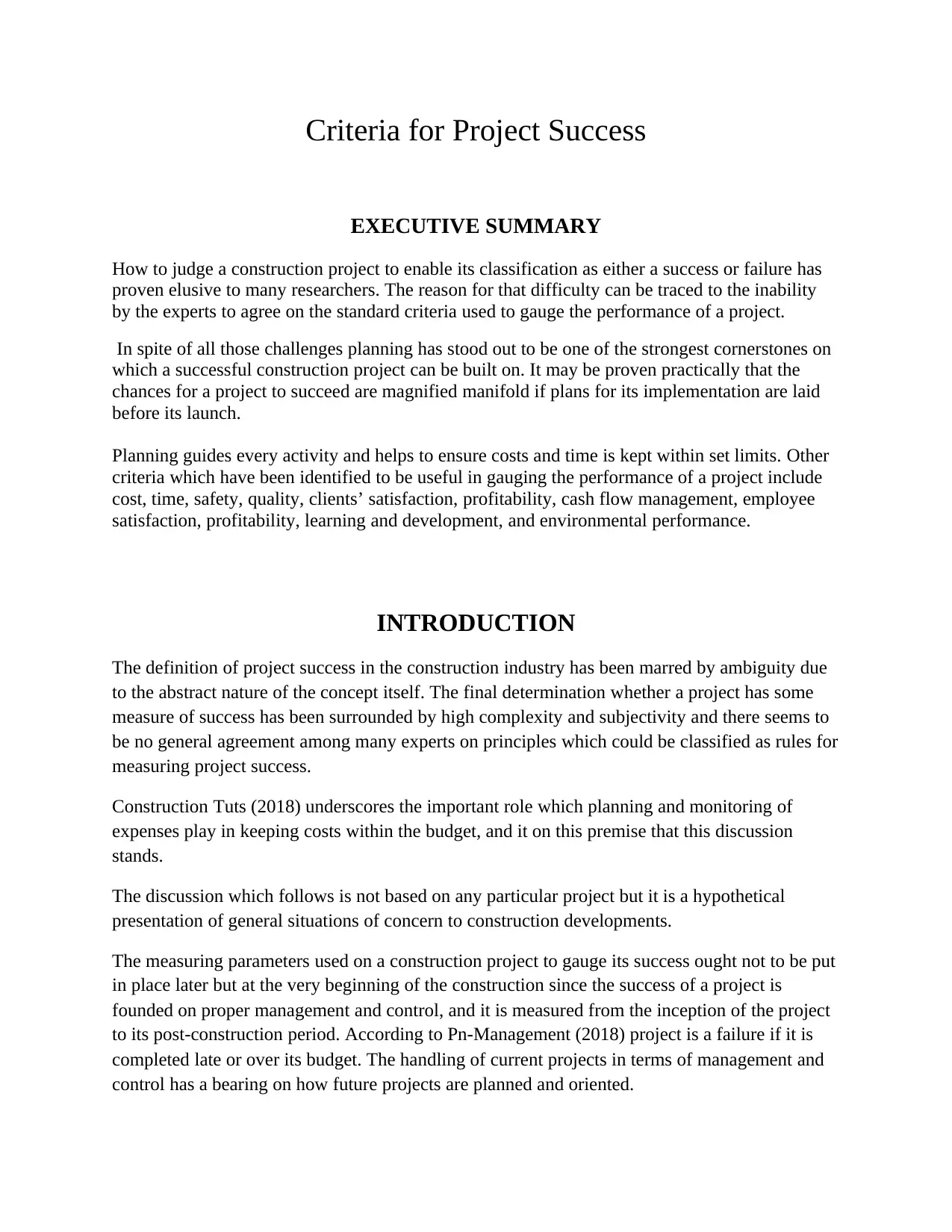
Criteria for Project Success
EXECUTIVE SUMMARY
How to judge a construction project to enable its classification as either a success or failure has
proven elusive to many researchers. The reason for that difficulty can be traced to the inability
by the experts to agree on the standard criteria used to gauge the performance of a project.
In spite of all those challenges planning has stood out to be one of the strongest cornerstones on
which a successful construction project can be built on. It may be proven practically that the
chances for a project to succeed are magnified manifold if plans for its implementation are laid
before its launch.
Planning guides every activity and helps to ensure costs and time is kept within set limits. Other
criteria which have been identified to be useful in gauging the performance of a project include
cost, time, safety, quality, clients’ satisfaction, profitability, cash flow management, employee
satisfaction, profitability, learning and development, and environmental performance.
INTRODUCTION
The definition of project success in the construction industry has been marred by ambiguity due
to the abstract nature of the concept itself. The final determination whether a project has some
measure of success has been surrounded by high complexity and subjectivity and there seems to
be no general agreement among many experts on principles which could be classified as rules for
measuring project success.
Construction Tuts (2018) underscores the important role which planning and monitoring of
expenses play in keeping costs within the budget, and it on this premise that this discussion
stands.
The discussion which follows is not based on any particular project but it is a hypothetical
presentation of general situations of concern to construction developments.
The measuring parameters used on a construction project to gauge its success ought not to be put
in place later but at the very beginning of the construction since the success of a project is
founded on proper management and control, and it is measured from the inception of the project
to its post-construction period. According to Pn-Management (2018) project is a failure if it is
completed late or over its budget. The handling of current projects in terms of management and
control has a bearing on how future projects are planned and oriented.
EXECUTIVE SUMMARY
How to judge a construction project to enable its classification as either a success or failure has
proven elusive to many researchers. The reason for that difficulty can be traced to the inability
by the experts to agree on the standard criteria used to gauge the performance of a project.
In spite of all those challenges planning has stood out to be one of the strongest cornerstones on
which a successful construction project can be built on. It may be proven practically that the
chances for a project to succeed are magnified manifold if plans for its implementation are laid
before its launch.
Planning guides every activity and helps to ensure costs and time is kept within set limits. Other
criteria which have been identified to be useful in gauging the performance of a project include
cost, time, safety, quality, clients’ satisfaction, profitability, cash flow management, employee
satisfaction, profitability, learning and development, and environmental performance.
INTRODUCTION
The definition of project success in the construction industry has been marred by ambiguity due
to the abstract nature of the concept itself. The final determination whether a project has some
measure of success has been surrounded by high complexity and subjectivity and there seems to
be no general agreement among many experts on principles which could be classified as rules for
measuring project success.
Construction Tuts (2018) underscores the important role which planning and monitoring of
expenses play in keeping costs within the budget, and it on this premise that this discussion
stands.
The discussion which follows is not based on any particular project but it is a hypothetical
presentation of general situations of concern to construction developments.
The measuring parameters used on a construction project to gauge its success ought not to be put
in place later but at the very beginning of the construction since the success of a project is
founded on proper management and control, and it is measured from the inception of the project
to its post-construction period. According to Pn-Management (2018) project is a failure if it is
completed late or over its budget. The handling of current projects in terms of management and
control has a bearing on how future projects are planned and oriented.
Paraphrase This Document
Need a fresh take? Get an instant paraphrase of this document with our AI Paraphraser
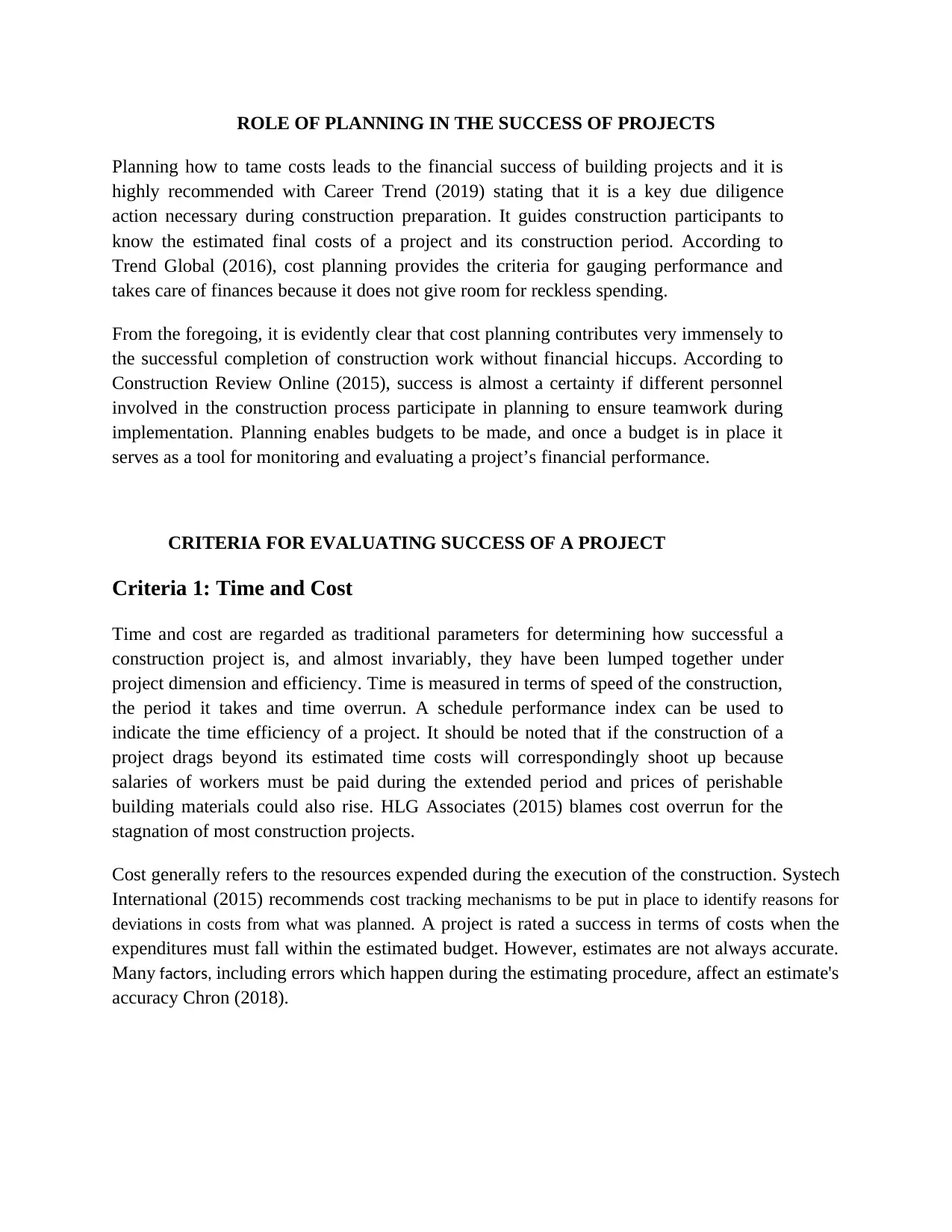
ROLE OF PLANNING IN THE SUCCESS OF PROJECTS
Planning how to tame costs leads to the financial success of building projects and it is
highly recommended with Career Trend (2019) stating that it is a key due diligence
action necessary during construction preparation. It guides construction participants to
know the estimated final costs of a project and its construction period. According to
Trend Global (2016), cost planning provides the criteria for gauging performance and
takes care of finances because it does not give room for reckless spending.
From the foregoing, it is evidently clear that cost planning contributes very immensely to
the successful completion of construction work without financial hiccups. According to
Construction Review Online (2015), success is almost a certainty if different personnel
involved in the construction process participate in planning to ensure teamwork during
implementation. Planning enables budgets to be made, and once a budget is in place it
serves as a tool for monitoring and evaluating a project’s financial performance.
CRITERIA FOR EVALUATING SUCCESS OF A PROJECT
Criteria 1: Time and Cost
Time and cost are regarded as traditional parameters for determining how successful a
construction project is, and almost invariably, they have been lumped together under
project dimension and efficiency. Time is measured in terms of speed of the construction,
the period it takes and time overrun. A schedule performance index can be used to
indicate the time efficiency of a project. It should be noted that if the construction of a
project drags beyond its estimated time costs will correspondingly shoot up because
salaries of workers must be paid during the extended period and prices of perishable
building materials could also rise. HLG Associates (2015) blames cost overrun for the
stagnation of most construction projects.
Cost generally refers to the resources expended during the execution of the construction. Systech
International (2015) recommends cost tracking mechanisms to be put in place to identify reasons for
deviations in costs from what was planned. A project is rated a success in terms of costs when the
expenditures must fall within the estimated budget. However, estimates are not always accurate.
Many factors, including errors which happen during the estimating procedure, affect an estimate's
accuracy Chron (2018).
Planning how to tame costs leads to the financial success of building projects and it is
highly recommended with Career Trend (2019) stating that it is a key due diligence
action necessary during construction preparation. It guides construction participants to
know the estimated final costs of a project and its construction period. According to
Trend Global (2016), cost planning provides the criteria for gauging performance and
takes care of finances because it does not give room for reckless spending.
From the foregoing, it is evidently clear that cost planning contributes very immensely to
the successful completion of construction work without financial hiccups. According to
Construction Review Online (2015), success is almost a certainty if different personnel
involved in the construction process participate in planning to ensure teamwork during
implementation. Planning enables budgets to be made, and once a budget is in place it
serves as a tool for monitoring and evaluating a project’s financial performance.
CRITERIA FOR EVALUATING SUCCESS OF A PROJECT
Criteria 1: Time and Cost
Time and cost are regarded as traditional parameters for determining how successful a
construction project is, and almost invariably, they have been lumped together under
project dimension and efficiency. Time is measured in terms of speed of the construction,
the period it takes and time overrun. A schedule performance index can be used to
indicate the time efficiency of a project. It should be noted that if the construction of a
project drags beyond its estimated time costs will correspondingly shoot up because
salaries of workers must be paid during the extended period and prices of perishable
building materials could also rise. HLG Associates (2015) blames cost overrun for the
stagnation of most construction projects.
Cost generally refers to the resources expended during the execution of the construction. Systech
International (2015) recommends cost tracking mechanisms to be put in place to identify reasons for
deviations in costs from what was planned. A project is rated a success in terms of costs when the
expenditures must fall within the estimated budget. However, estimates are not always accurate.
Many factors, including errors which happen during the estimating procedure, affect an estimate's
accuracy Chron (2018).
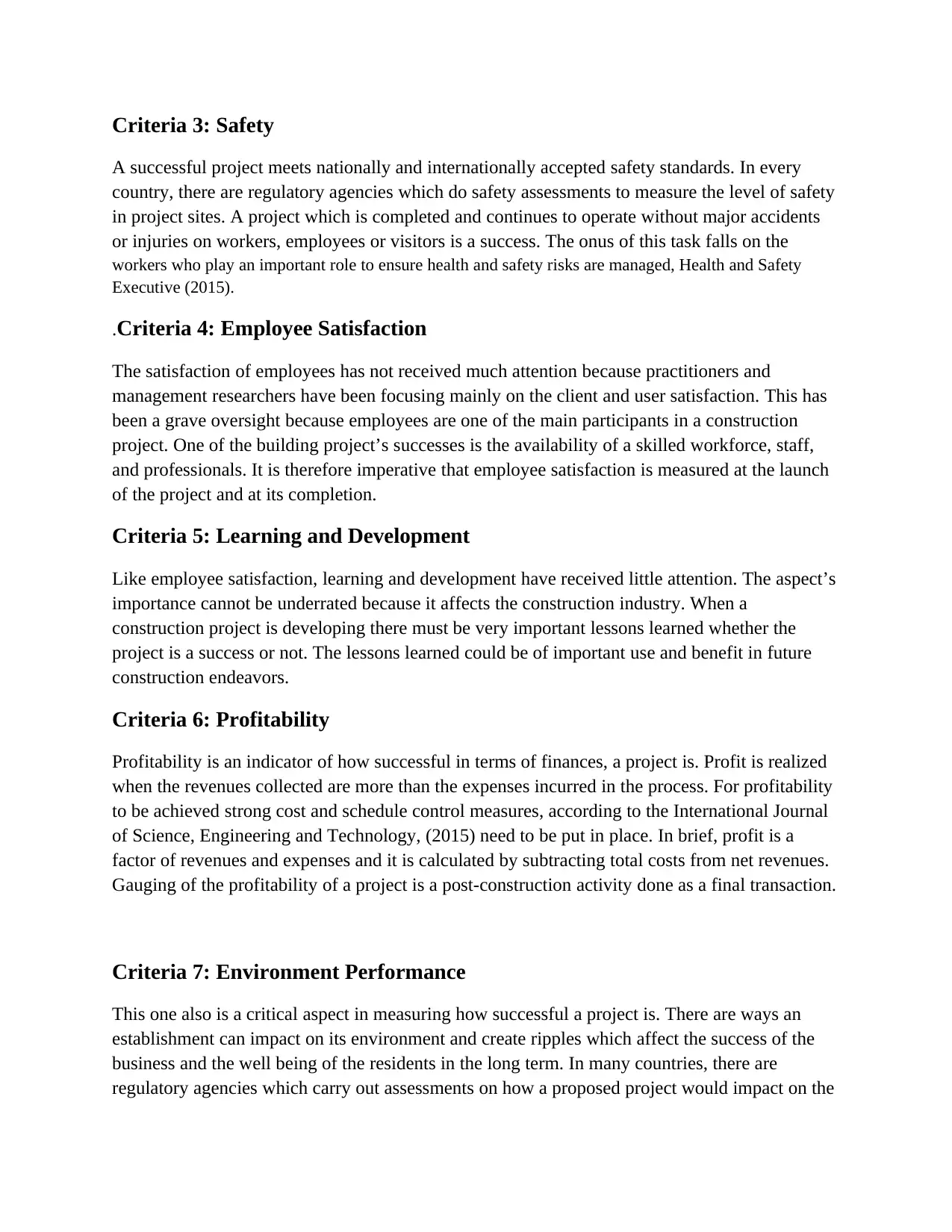
Criteria 3: Safety
A successful project meets nationally and internationally accepted safety standards. In every
country, there are regulatory agencies which do safety assessments to measure the level of safety
in project sites. A project which is completed and continues to operate without major accidents
or injuries on workers, employees or visitors is a success. The onus of this task falls on the
workers who play an important role to ensure health and safety risks are managed, Health and Safety
Executive (2015).
.Criteria 4: Employee Satisfaction
The satisfaction of employees has not received much attention because practitioners and
management researchers have been focusing mainly on the client and user satisfaction. This has
been a grave oversight because employees are one of the main participants in a construction
project. One of the building project’s successes is the availability of a skilled workforce, staff,
and professionals. It is therefore imperative that employee satisfaction is measured at the launch
of the project and at its completion.
Criteria 5: Learning and Development
Like employee satisfaction, learning and development have received little attention. The aspect’s
importance cannot be underrated because it affects the construction industry. When a
construction project is developing there must be very important lessons learned whether the
project is a success or not. The lessons learned could be of important use and benefit in future
construction endeavors.
Criteria 6: Profitability
Profitability is an indicator of how successful in terms of finances, a project is. Profit is realized
when the revenues collected are more than the expenses incurred in the process. For profitability
to be achieved strong cost and schedule control measures, according to the International Journal
of Science, Engineering and Technology, (2015) need to be put in place. In brief, profit is a
factor of revenues and expenses and it is calculated by subtracting total costs from net revenues.
Gauging of the profitability of a project is a post-construction activity done as a final transaction.
Criteria 7: Environment Performance
This one also is a critical aspect in measuring how successful a project is. There are ways an
establishment can impact on its environment and create ripples which affect the success of the
business and the well being of the residents in the long term. In many countries, there are
regulatory agencies which carry out assessments on how a proposed project would impact on the
A successful project meets nationally and internationally accepted safety standards. In every
country, there are regulatory agencies which do safety assessments to measure the level of safety
in project sites. A project which is completed and continues to operate without major accidents
or injuries on workers, employees or visitors is a success. The onus of this task falls on the
workers who play an important role to ensure health and safety risks are managed, Health and Safety
Executive (2015).
.Criteria 4: Employee Satisfaction
The satisfaction of employees has not received much attention because practitioners and
management researchers have been focusing mainly on the client and user satisfaction. This has
been a grave oversight because employees are one of the main participants in a construction
project. One of the building project’s successes is the availability of a skilled workforce, staff,
and professionals. It is therefore imperative that employee satisfaction is measured at the launch
of the project and at its completion.
Criteria 5: Learning and Development
Like employee satisfaction, learning and development have received little attention. The aspect’s
importance cannot be underrated because it affects the construction industry. When a
construction project is developing there must be very important lessons learned whether the
project is a success or not. The lessons learned could be of important use and benefit in future
construction endeavors.
Criteria 6: Profitability
Profitability is an indicator of how successful in terms of finances, a project is. Profit is realized
when the revenues collected are more than the expenses incurred in the process. For profitability
to be achieved strong cost and schedule control measures, according to the International Journal
of Science, Engineering and Technology, (2015) need to be put in place. In brief, profit is a
factor of revenues and expenses and it is calculated by subtracting total costs from net revenues.
Gauging of the profitability of a project is a post-construction activity done as a final transaction.
Criteria 7: Environment Performance
This one also is a critical aspect in measuring how successful a project is. There are ways an
establishment can impact on its environment and create ripples which affect the success of the
business and the well being of the residents in the long term. In many countries, there are
regulatory agencies which carry out assessments on how a proposed project would impact on the
⊘ This is a preview!⊘
Do you want full access?
Subscribe today to unlock all pages.

Trusted by 1+ million students worldwide
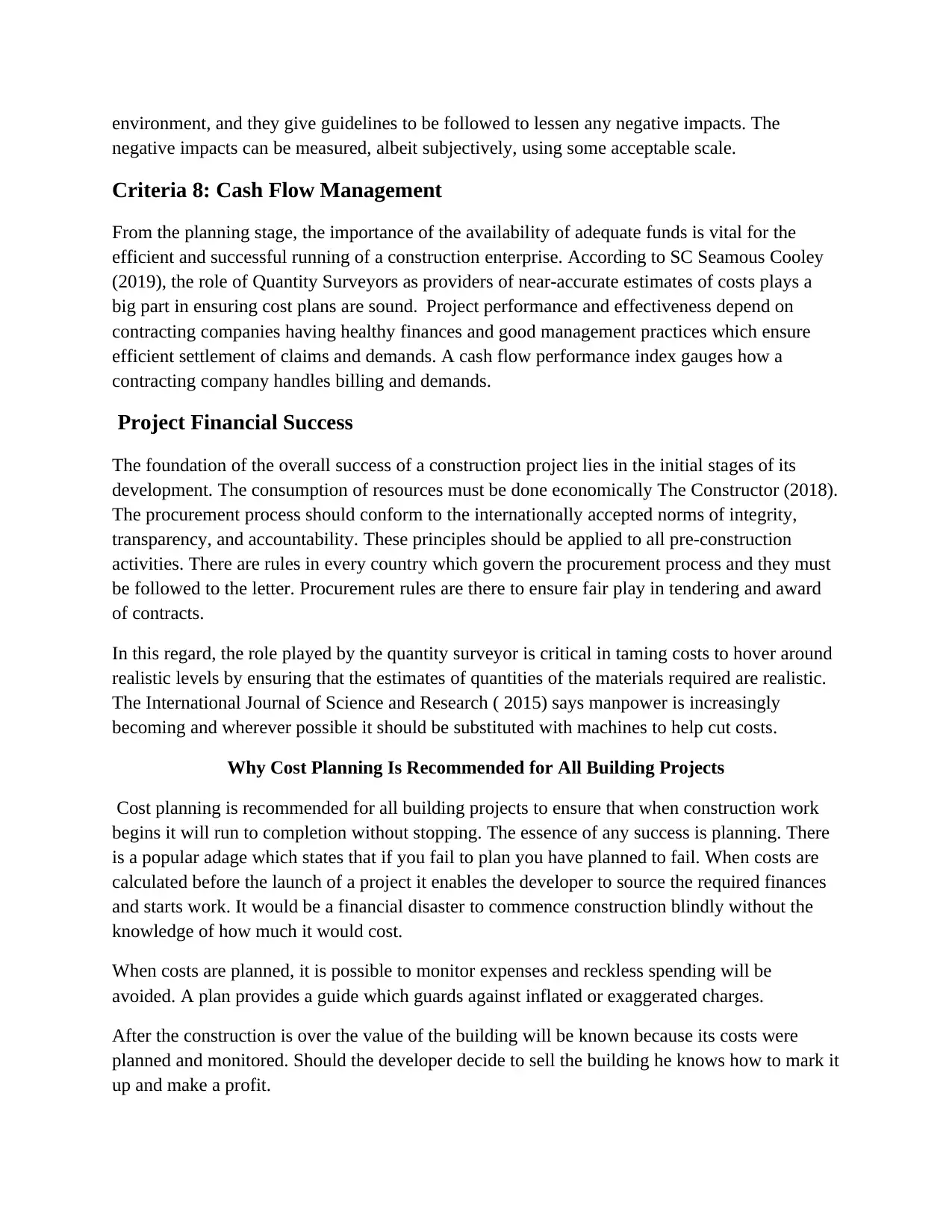
environment, and they give guidelines to be followed to lessen any negative impacts. The
negative impacts can be measured, albeit subjectively, using some acceptable scale.
Criteria 8: Cash Flow Management
From the planning stage, the importance of the availability of adequate funds is vital for the
efficient and successful running of a construction enterprise. According to SC Seamous Cooley
(2019), the role of Quantity Surveyors as providers of near-accurate estimates of costs plays a
big part in ensuring cost plans are sound. Project performance and effectiveness depend on
contracting companies having healthy finances and good management practices which ensure
efficient settlement of claims and demands. A cash flow performance index gauges how a
contracting company handles billing and demands.
Project Financial Success
The foundation of the overall success of a construction project lies in the initial stages of its
development. The consumption of resources must be done economically The Constructor (2018).
The procurement process should conform to the internationally accepted norms of integrity,
transparency, and accountability. These principles should be applied to all pre-construction
activities. There are rules in every country which govern the procurement process and they must
be followed to the letter. Procurement rules are there to ensure fair play in tendering and award
of contracts.
In this regard, the role played by the quantity surveyor is critical in taming costs to hover around
realistic levels by ensuring that the estimates of quantities of the materials required are realistic.
The International Journal of Science and Research ( 2015) says manpower is increasingly
becoming and wherever possible it should be substituted with machines to help cut costs.
Why Cost Planning Is Recommended for All Building Projects
Cost planning is recommended for all building projects to ensure that when construction work
begins it will run to completion without stopping. The essence of any success is planning. There
is a popular adage which states that if you fail to plan you have planned to fail. When costs are
calculated before the launch of a project it enables the developer to source the required finances
and starts work. It would be a financial disaster to commence construction blindly without the
knowledge of how much it would cost.
When costs are planned, it is possible to monitor expenses and reckless spending will be
avoided. A plan provides a guide which guards against inflated or exaggerated charges.
After the construction is over the value of the building will be known because its costs were
planned and monitored. Should the developer decide to sell the building he knows how to mark it
up and make a profit.
negative impacts can be measured, albeit subjectively, using some acceptable scale.
Criteria 8: Cash Flow Management
From the planning stage, the importance of the availability of adequate funds is vital for the
efficient and successful running of a construction enterprise. According to SC Seamous Cooley
(2019), the role of Quantity Surveyors as providers of near-accurate estimates of costs plays a
big part in ensuring cost plans are sound. Project performance and effectiveness depend on
contracting companies having healthy finances and good management practices which ensure
efficient settlement of claims and demands. A cash flow performance index gauges how a
contracting company handles billing and demands.
Project Financial Success
The foundation of the overall success of a construction project lies in the initial stages of its
development. The consumption of resources must be done economically The Constructor (2018).
The procurement process should conform to the internationally accepted norms of integrity,
transparency, and accountability. These principles should be applied to all pre-construction
activities. There are rules in every country which govern the procurement process and they must
be followed to the letter. Procurement rules are there to ensure fair play in tendering and award
of contracts.
In this regard, the role played by the quantity surveyor is critical in taming costs to hover around
realistic levels by ensuring that the estimates of quantities of the materials required are realistic.
The International Journal of Science and Research ( 2015) says manpower is increasingly
becoming and wherever possible it should be substituted with machines to help cut costs.
Why Cost Planning Is Recommended for All Building Projects
Cost planning is recommended for all building projects to ensure that when construction work
begins it will run to completion without stopping. The essence of any success is planning. There
is a popular adage which states that if you fail to plan you have planned to fail. When costs are
calculated before the launch of a project it enables the developer to source the required finances
and starts work. It would be a financial disaster to commence construction blindly without the
knowledge of how much it would cost.
When costs are planned, it is possible to monitor expenses and reckless spending will be
avoided. A plan provides a guide which guards against inflated or exaggerated charges.
After the construction is over the value of the building will be known because its costs were
planned and monitored. Should the developer decide to sell the building he knows how to mark it
up and make a profit.
Paraphrase This Document
Need a fresh take? Get an instant paraphrase of this document with our AI Paraphraser
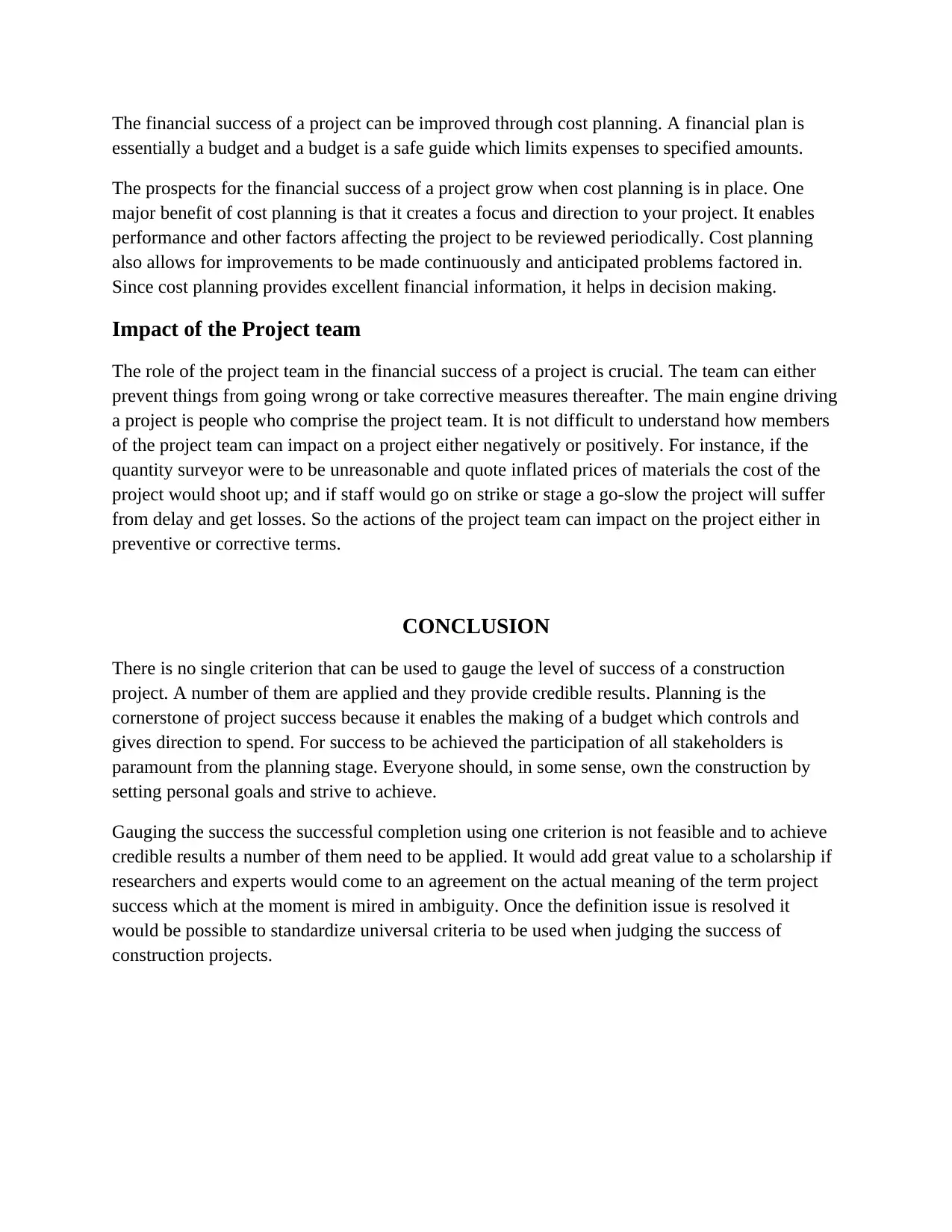
The financial success of a project can be improved through cost planning. A financial plan is
essentially a budget and a budget is a safe guide which limits expenses to specified amounts.
The prospects for the financial success of a project grow when cost planning is in place. One
major benefit of cost planning is that it creates a focus and direction to your project. It enables
performance and other factors affecting the project to be reviewed periodically. Cost planning
also allows for improvements to be made continuously and anticipated problems factored in.
Since cost planning provides excellent financial information, it helps in decision making.
Impact of the Project team
The role of the project team in the financial success of a project is crucial. The team can either
prevent things from going wrong or take corrective measures thereafter. The main engine driving
a project is people who comprise the project team. It is not difficult to understand how members
of the project team can impact on a project either negatively or positively. For instance, if the
quantity surveyor were to be unreasonable and quote inflated prices of materials the cost of the
project would shoot up; and if staff would go on strike or stage a go-slow the project will suffer
from delay and get losses. So the actions of the project team can impact on the project either in
preventive or corrective terms.
CONCLUSION
There is no single criterion that can be used to gauge the level of success of a construction
project. A number of them are applied and they provide credible results. Planning is the
cornerstone of project success because it enables the making of a budget which controls and
gives direction to spend. For success to be achieved the participation of all stakeholders is
paramount from the planning stage. Everyone should, in some sense, own the construction by
setting personal goals and strive to achieve.
Gauging the success the successful completion using one criterion is not feasible and to achieve
credible results a number of them need to be applied. It would add great value to a scholarship if
researchers and experts would come to an agreement on the actual meaning of the term project
success which at the moment is mired in ambiguity. Once the definition issue is resolved it
would be possible to standardize universal criteria to be used when judging the success of
construction projects.
essentially a budget and a budget is a safe guide which limits expenses to specified amounts.
The prospects for the financial success of a project grow when cost planning is in place. One
major benefit of cost planning is that it creates a focus and direction to your project. It enables
performance and other factors affecting the project to be reviewed periodically. Cost planning
also allows for improvements to be made continuously and anticipated problems factored in.
Since cost planning provides excellent financial information, it helps in decision making.
Impact of the Project team
The role of the project team in the financial success of a project is crucial. The team can either
prevent things from going wrong or take corrective measures thereafter. The main engine driving
a project is people who comprise the project team. It is not difficult to understand how members
of the project team can impact on a project either negatively or positively. For instance, if the
quantity surveyor were to be unreasonable and quote inflated prices of materials the cost of the
project would shoot up; and if staff would go on strike or stage a go-slow the project will suffer
from delay and get losses. So the actions of the project team can impact on the project either in
preventive or corrective terms.
CONCLUSION
There is no single criterion that can be used to gauge the level of success of a construction
project. A number of them are applied and they provide credible results. Planning is the
cornerstone of project success because it enables the making of a budget which controls and
gives direction to spend. For success to be achieved the participation of all stakeholders is
paramount from the planning stage. Everyone should, in some sense, own the construction by
setting personal goals and strive to achieve.
Gauging the success the successful completion using one criterion is not feasible and to achieve
credible results a number of them need to be applied. It would add great value to a scholarship if
researchers and experts would come to an agreement on the actual meaning of the term project
success which at the moment is mired in ambiguity. Once the definition issue is resolved it
would be possible to standardize universal criteria to be used when judging the success of
construction projects.
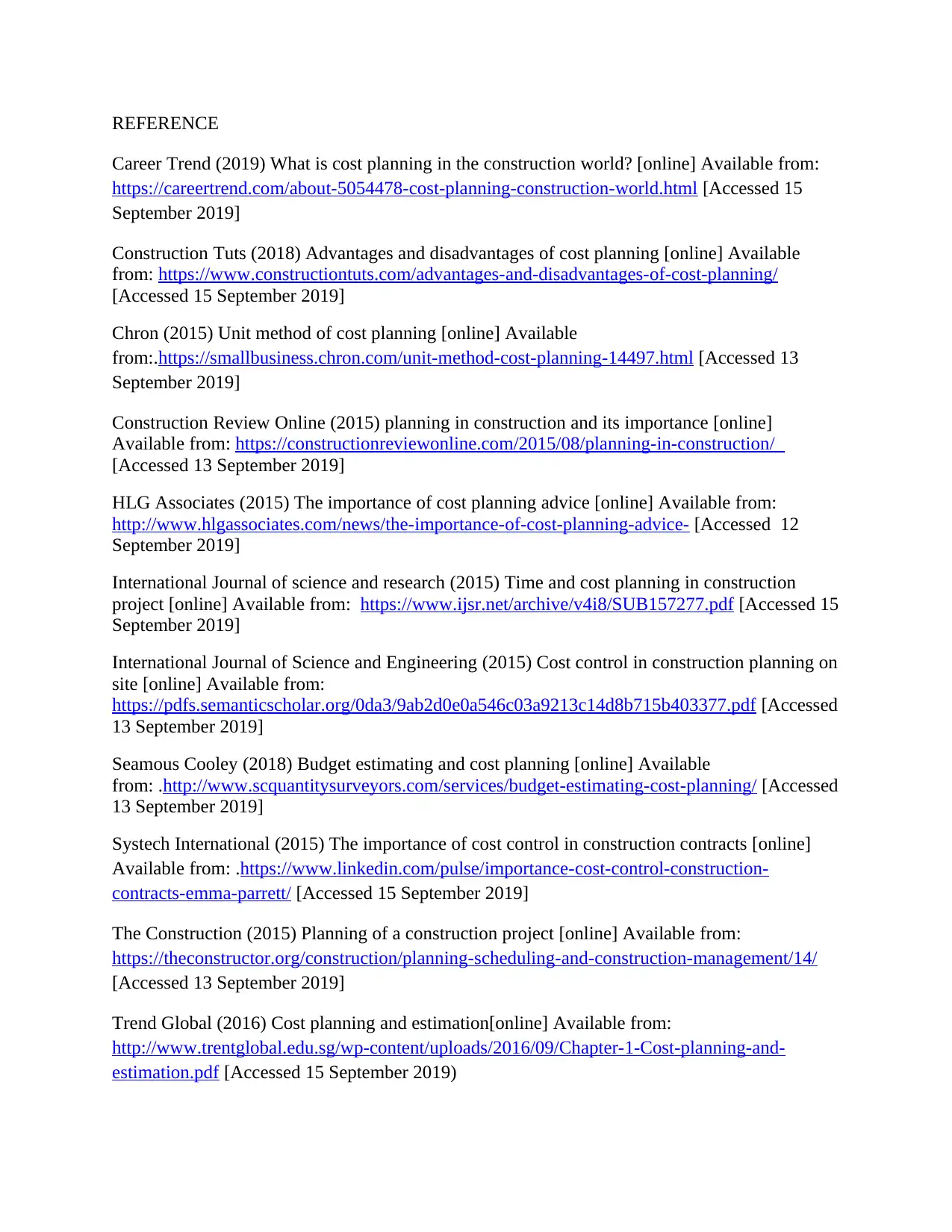
REFERENCE
Career Trend (2019) What is cost planning in the construction world? [online] Available from:
https://careertrend.com/about-5054478-cost-planning-construction-world.html [Accessed 15
September 2019]
Construction Tuts (2018) Advantages and disadvantages of cost planning [online] Available
from: https://www.constructiontuts.com/advantages-and-disadvantages-of-cost-planning/
[Accessed 15 September 2019]
Chron (2015) Unit method of cost planning [online] Available
from:.https://smallbusiness.chron.com/unit-method-cost-planning-14497.html [Accessed 13
September 2019]
Construction Review Online (2015) planning in construction and its importance [online]
Available from: https://constructionreviewonline.com/2015/08/planning-in-construction/
[Accessed 13 September 2019]
HLG Associates (2015) The importance of cost planning advice [online] Available from:
http://www.hlgassociates.com/news/the-importance-of-cost-planning-advice- [Accessed 12
September 2019]
International Journal of science and research (2015) Time and cost planning in construction
project [online] Available from: https://www.ijsr.net/archive/v4i8/SUB157277.pdf [Accessed 15
September 2019]
International Journal of Science and Engineering (2015) Cost control in construction planning on
site [online] Available from:
https://pdfs.semanticscholar.org/0da3/9ab2d0e0a546c03a9213c14d8b715b403377.pdf [Accessed
13 September 2019]
Seamous Cooley (2018) Budget estimating and cost planning [online] Available
from: .http://www.scquantitysurveyors.com/services/budget-estimating-cost-planning/ [Accessed
13 September 2019]
Systech International (2015) The importance of cost control in construction contracts [online]
Available from: .https://www.linkedin.com/pulse/importance-cost-control-construction-
contracts-emma-parrett/ [Accessed 15 September 2019]
The Construction (2015) Planning of a construction project [online] Available from:
https://theconstructor.org/construction/planning-scheduling-and-construction-management/14/
[Accessed 13 September 2019]
Trend Global (2016) Cost planning and estimation[online] Available from:
http://www.trentglobal.edu.sg/wp-content/uploads/2016/09/Chapter-1-Cost-planning-and-
estimation.pdf [Accessed 15 September 2019)
Career Trend (2019) What is cost planning in the construction world? [online] Available from:
https://careertrend.com/about-5054478-cost-planning-construction-world.html [Accessed 15
September 2019]
Construction Tuts (2018) Advantages and disadvantages of cost planning [online] Available
from: https://www.constructiontuts.com/advantages-and-disadvantages-of-cost-planning/
[Accessed 15 September 2019]
Chron (2015) Unit method of cost planning [online] Available
from:.https://smallbusiness.chron.com/unit-method-cost-planning-14497.html [Accessed 13
September 2019]
Construction Review Online (2015) planning in construction and its importance [online]
Available from: https://constructionreviewonline.com/2015/08/planning-in-construction/
[Accessed 13 September 2019]
HLG Associates (2015) The importance of cost planning advice [online] Available from:
http://www.hlgassociates.com/news/the-importance-of-cost-planning-advice- [Accessed 12
September 2019]
International Journal of science and research (2015) Time and cost planning in construction
project [online] Available from: https://www.ijsr.net/archive/v4i8/SUB157277.pdf [Accessed 15
September 2019]
International Journal of Science and Engineering (2015) Cost control in construction planning on
site [online] Available from:
https://pdfs.semanticscholar.org/0da3/9ab2d0e0a546c03a9213c14d8b715b403377.pdf [Accessed
13 September 2019]
Seamous Cooley (2018) Budget estimating and cost planning [online] Available
from: .http://www.scquantitysurveyors.com/services/budget-estimating-cost-planning/ [Accessed
13 September 2019]
Systech International (2015) The importance of cost control in construction contracts [online]
Available from: .https://www.linkedin.com/pulse/importance-cost-control-construction-
contracts-emma-parrett/ [Accessed 15 September 2019]
The Construction (2015) Planning of a construction project [online] Available from:
https://theconstructor.org/construction/planning-scheduling-and-construction-management/14/
[Accessed 13 September 2019]
Trend Global (2016) Cost planning and estimation[online] Available from:
http://www.trentglobal.edu.sg/wp-content/uploads/2016/09/Chapter-1-Cost-planning-and-
estimation.pdf [Accessed 15 September 2019)
⊘ This is a preview!⊘
Do you want full access?
Subscribe today to unlock all pages.

Trusted by 1+ million students worldwide

Pn-Management (2016) What makes a project successful? [online] Available from:
https://www.pn-projectmanagement.com/construction-management-blog/what-makes-a-project-
successful [ Accessed 15 September 2019]
https://www.pn-projectmanagement.com/construction-management-blog/what-makes-a-project-
successful [ Accessed 15 September 2019]
1 out of 7
Related Documents
Your All-in-One AI-Powered Toolkit for Academic Success.
+13062052269
info@desklib.com
Available 24*7 on WhatsApp / Email
![[object Object]](/_next/static/media/star-bottom.7253800d.svg)
Unlock your academic potential
Copyright © 2020–2026 A2Z Services. All Rights Reserved. Developed and managed by ZUCOL.





